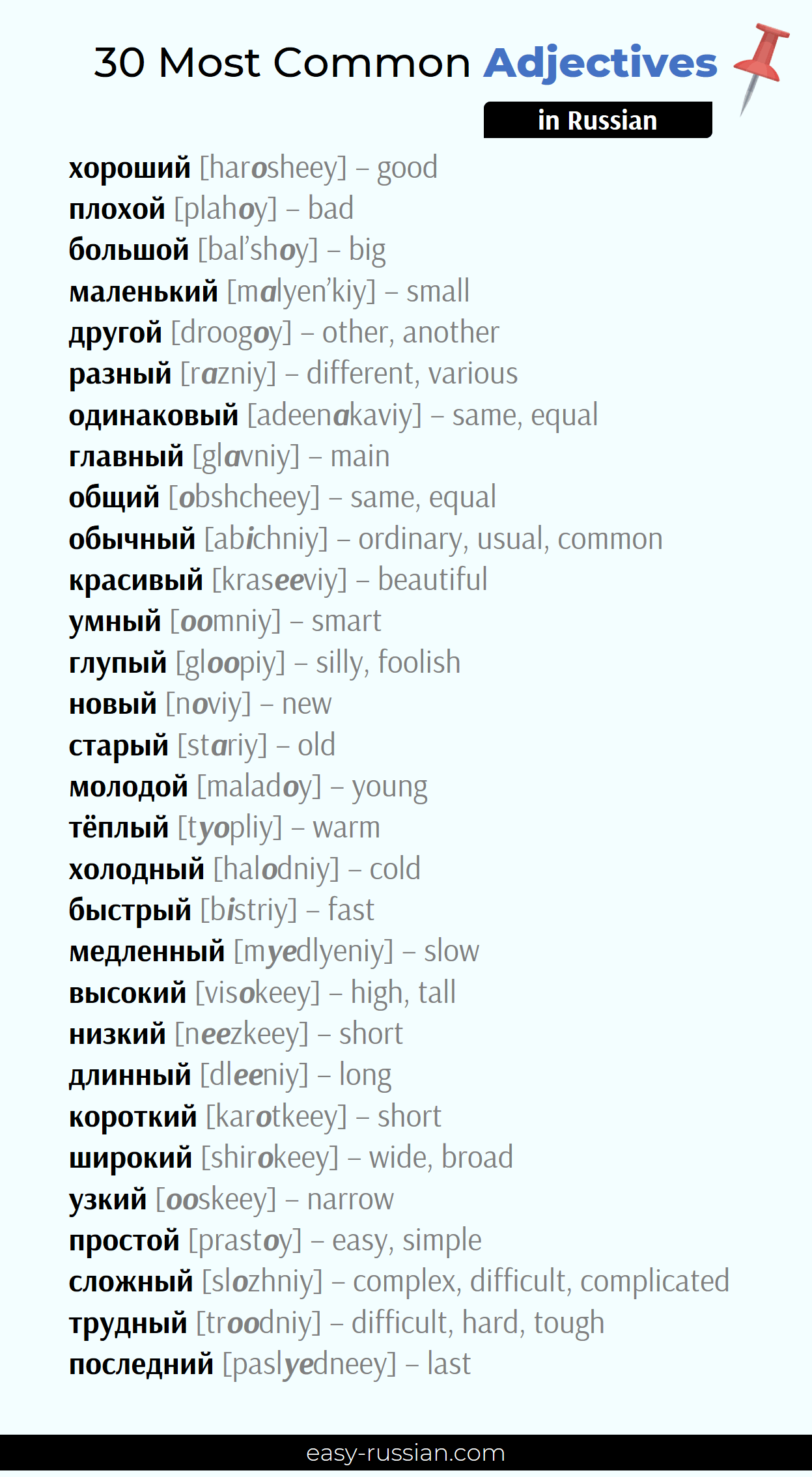100 Common Russian Adjectives with Examples in Context
Looking to expand your Russian vocabulary? Look no further than this comprehensive guide to 100 common adjectives in the language. This list covers a wide range of adjectives that you’ll encounter in everyday conversation.
Each word is accompanied by example sentences to help you understand how it’s used in context, and the article is designed to be user-friendly and accessible for learners at all levels. Each adjective has a transcription, allowing you to learn the correct pronunciation.
If you want a list of adjectives without examples, just download my PDF!
So, let’s learn some new words!
хороший [harosheey] – good
У тебя хороший вкус. [oo teebya harosheey fkoos] – You’ve got good taste.
плохой [plahoy] – bad
Я плохой парень и плохой друг. [ya plahoy paryen’ plahoy drook] – I’m a bad guy and a bad friend.
большой [bal’shoy] – big
У него большая семья. [oo neevo bal’shaya seem’ya] – He has a big family.
маленький [malyen’kiy] – small
Она такая маленькая. [ana takaya malyen’kaya] – She’s so little.
другой [droogoy] – other, another
Думаю, мы найдем другой способ. [doomayu mi naydyom droogoy sposap] – I guess we’ll find another way.
разный [razniy] – different, various
Люди могут иметь разные взгляды. [lyudee mogoot eemyet’ razniye vzglyadi] – People can take a different views.
одинаковый [adeenakaviy] – same, equal
У нас с сестрой одинаковые интересы. – My sister and I have the same interests.
главный [glavniy] – main
Моя главная проблема – отсутствие свободного времени. [maya glavnaya prablyema atsootstveeye svabodnava vryemyenee] – My main problem is the lack of free time.
общий [obshcheey] – same, equal; total
Людей в интернете могут объединять общие интересы. – People on the internet can share common interests.
обычный [abichniy] – ordinary, regular, usual, common
Главным героем фильма является обычный мужчина. – The hero of the film is a common man.
красивый [kraseeviy] – beautiful
Париж – красивый город. [pareezh kraseeviy gorat] – Paris is a beautiful city.
умный [oomniy] – smart
Мой брат очень умный. [Moy brat ochen’ oomniy.] – My brother is very smart.
глупый [gloopiy] – silly, foolish
Это был очень глупый поступок. [Etot postoopak ochen’ gloopiy.] – This was a very foolish action.
новый [noviy] – new
У меня новый компьютер. [OO meenya noviy kamp’yuter.] – I have a new computer.
старый [stariy] – old
Мой дедушка очень старый. [Moy dyedooshka ochen’ stariy.] – My grandfather is very old.
молодой [maladoy] – young
Пока мы молодые, кажется, что жизнь будет длиться вечно. – When we are young, we think life will go on forever.
тёплый [tyopliy] – warm
Зимой потребуется тёплая куртка. – In winter, a warm jacket will be needed.
горячий [garyacheey] – hot
Я принесла тебе вкусный горячий суп. – I’ve got some nice, hot soup for you.
холодный [halodniy] – cold
Я не хочу пить этот чай, он холодный. [ya nee hachoo peet’ etat chay, on halodniy] – I don’t want to drink this tea, it’s cold.
быстрый [bistriy] – fast
У него очень быстрый интернет. – His internet is really fast.
медленный [myedlyeniy] – slow
Выход из депрессии – медленный процесс, но, в конце концов, вы снова станете собой. – The exit from depression is a slow process but in the end you will be yourself again.
высокий [visokeey] – high, tall
Эта башня очень высокая. [Eta bashnya ochyen’ visokaya.] – This tower is very tall.
низкий [neezkeey] – short
Цена на эту машину очень низкая. – The price for this car is very low.
Твой низкий голос пугает мою маму. – Your deep voice scares my mother.
длинный [dleeniy] – long
Этот коридор очень длинный. [Etat kareedor ochyen’ dleenniy.] – This corridor is very long.
короткий [karotkeey] – short
Эта юбка слишком короткая. [Eta yupka sleeshkam karotkaya.] – This skirt is too short.
широкий [shirokeey] – wide, broad
Волга – самая широкая река в России. – Volga is the widest river in Russia.
узкий [ooskeey] – narrow
Этот переулок очень узкий. [Etat pyeryeoolak ochyen’ ooskeey.] – This alley is very narrow.
простой [prastoy] – easy, simple
У него всегда есть простые и понятные объяснения. – He always has simple explanations.
Я предпочитаю простую одежду, чтобы чувствовать себя комфортно. – I prefer simple clothes to feel comfortable.
сложный [slozhniy] – complex, difficult, complicated
У него сложные отношения с родителями. – He has a complicated relationship with his parents.
Мы столкнулись с очень сложной ситуацией. – We faced a very complicated situation.
трудный [troodniy] – difficult, hard, tough
Многие считают, что изучение иностранного языка — трудная задача, но на самом деле все зависит от нашей настойчивости. – Many people believe that learning a foreign language is a difficult task, but in reality, it all depends on our persistence.
Наша команда столкнулась с трудной задачей, но мы смогли её решить. – Our team faced a difficult task, but we were able to solve it.
Народ этой страны переживает трудные времена. – The people of that nation are going through a difficult time.
последний [paslyedneey] – last
Он был последним из тех, кто покинул комнату. – He was the last one to leave the room.
полный [polniy] – full
Мы должны иметь над ним полный контроль. – We should have complete control over it.
пустой [poostoy] – empty
У меня есть пустая бутылка, которую можно использовать для воды. – I have an empty bottle that can be used for storing water.
сильный [seel’niy] – strong, powerful
С востока дует очень сильный ветер. – There’s a very strong wind from the east now.
крепкий [kryepkeey] – sturdy, strong, robust
Мы помогаем друг другу, у нас настоящая крепкая семья. – We help each other, we have a real strong family.
слабый [slabiy] – weak
До года ребенок имеет слишком слабый организм. – Infants have a weak organism in the first year.
мокрый [mokriy] – wet
Мои документы спустя сутки ещё были мокрые. – My clothes were still wet 24 hours later.
сухой [soohoy] – dry
У моей дочери с рождения очень сухая кожа. – My daughter has had extremely dry skin since birth.
круглый [kroogliy] – round
Я купила круглый стол. [Ya koopeela kroogliy stol.] – I bought a round table.
мягкий [myahkeey] – soft
твёрдый [tvyordiy] – hard
лёгкий [lyohkeey] – light/easy
тяжёлый [tyazhyoliy] – heavy
тонкий [tonkeey] – thin
толстый [tolstiy] – thick
худой [hoodoy] – skinny
Вы слишком худой; вам нужно есть больше. – You’re too thin. You ought to eat more.
тихий [teeheey] – quiet
Это самое тихое место на всем побережье. – This is the most quiet place on the coast.
громкий [gromkeey] – loud
Слишком громкая музыка наносит непоправимый вред вашему слуху. – Excessive loud music may lead to irreparable damage to your ears.
шумный [shoomniy] – noisy
светлый [svyetliy] – light, luminous
тёмный [tyomniy] – dark
бедный [byedniy] – poor
богатый [bagatiy] – rich
прямой [pryamoy] – straight
изогнутый [eezognootiy] – curved
гладкий [glatkeey] – smooth
яркий [yarkeey] – bright
чистый [cheestiy] – clean
грязный [gryazniy] – dirty
свежий [svyezheey] – fresh
Я всегда покупаю свежие овощи вместо замороженных. – I always buy fresh vegetables instead of frozen ones.
дорогой [daragoy] – expensive
Я не покупаю дорогие вещи. – I don’t buy expensive things.
дешёвый [dyeshoviy] – cheap
Я купил дешёвую футболку. [Ya koopeel dyeshyovooyu footbolkoo.] – I bought a cheap t-shirt.
вкусный [fkoosniy] – delicious, tasty
сладкий [slatkeey] – sweet
Я люблю сладкие фрукты. [Ya lyublyu slatkeeye frookti.] – I love sweet fruits.
горький [gor’kiy] – bitter
Этот гриб есть нельзя, он горький. – This mushroom cannot be eaten, it’s bitter.
кислый [keesliy] – sour
Если жизнь подсунула тебе кислый лимон, то подумай где взять соль и текилу. – If life dropped you a sour lemon, look for salt and tequila.
солёный [salyoniy] – salty
Около 60% всех озер солёные. – About 60% of all lakes are salty.
удобный [oodobniy] – comfortable
Этот диван очень удобный. [Etat deevan ochyen’ oodobniy.] – This couch is very comfortable.
приятный [preeyatniy] – pleasant
острый [ostriy] – sharp
Нож очень острый. [Nozh ochyen’ ostriy.] – The knife is very sharp.
тупой [toopoy] – blunt
Этот карандаш тупой. [Etat karandash toopoy.] – This pencil is dull.
близкий [bleezkeey] – close
далёкий [dalyokeey] – far
закрытый [zakritiy] – closed
открытый [atkritiy] – open
свободный [svabodniy] – free, loose
Только свободный человек может преобразовать общество. – Only someone who is free is able to transform their society.
бесплатный [byesplatniy] – free of charge
интересный [eentyeryesniy] – interesting
скучный [skoochniy] – boring, dull
странный [stranniy] – strange, odd
добрый [dobriy] – kind, good
злой [zloy] – evil, angry, wicked
счастливый [shchasleeviy] – happy
Мы предпочитаем верить в счастливый конец. – People prefer to believe in the happy end.
грустный [groostniy] – sad
Этот фильм очень грустный. [Etat fee’lm ochyen’ groosniy.] – This movie is very sad.
здоровый [zdaroviy] – healthy
больной [bal’noy] – sick
спокойный [spakoyniy] – calm, peaceful
Характер этих людей спокойный, но иногда от них лучше держаться подальше. – The nature of these people is calm, but sometimes it is better to stay away from them.
особый [asobiy] – special
чужой [choozhoy] – foreign, alien
Я устал жить чужой жизнью. – I’m tired of living someone else’s life.
мощный [moshchniy] – powerful
Этот двигатель очень мощный. [Etat dveegatyel’ ochyen’ moshchniy.) – This engine is very powerful.
мёртвый [myortviy] – dead
живой [zhivoy] – alive
отличный [atleechniy] – great, excellent, fine
готовый [gatoviy] – ready, finished, prepared
ужасный [oozhasniy] – terrible, horrible, awful
страшный [strashniy] – terrible, scary, ugly
грубый [groobiy] – rough, rude
знакомый [znakomiy] – familiar, known
современный [savreemyeniy] – modern, contemporary
эффективный [efyekteevniy] – effective, efficient

